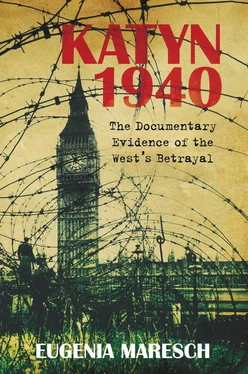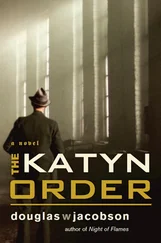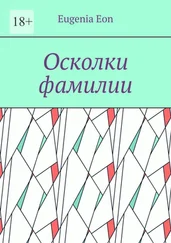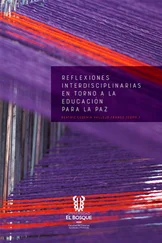The report described our trip to Katyn, its first impressions and the conclusion – that the graves contain, according to every possible conjecture, all the officers from Kozelsk and maybe other victims. Also I gave an assurance that ‘I would not give any other statements in this respect, now or in the future.’ It also contained a recommendation that the International Committee of the Red Cross should be entrusted with the investigation of Koze Gory.
I am giving all these details about the report, because in 1945, when I was being issued with a warrant, I asked my daughter to contact the PCK and obtain a copy of my report, as mine had been burned with other documents in Warsaw. The reply was that they did not have the report; if this were true, it would be interesting to find out where it had gone. A few days after my arrival I got the news from ‘Hubert’ that my report was immediately delivered to General [Stefan] Rowecki [Leader of the AK ], who asked for his appreciation to be passed on, that I had ‘served Poland well by [my] conduct regarding Katyn’. The report was going to be sent forthwith to London. Marian Buczkowski who acted as a go-between ‘Hubert’ and myself, passed this information to me. Buczkowski co-operated with the Propaganda Department of the AK in Warsaw, where he was in charge of ‘cell R’.
After the Bolsheviks entered Poland and had issued a search warrant for me; I was still in Poland for a time. The idea of attending court interested me, in the belief I could possibly raise the Katyn case. However, the authorities did not pursue me. The PCK has somewhere ‘mislaid’ my report on Katyn, and the news reached me that the majority of Poles who visited Katyn, whatever the mission, had signed a declaration presented to them by the [communist] procurator. The declaration read that they were forced by the Germans to visit Katyn and once they were there, they were convinced that the massacre was the deed of the Germans. I realised then, that under no circumstances would I be allowed to say a word about what I knew of Katyn. I left Poland in December 1945. In January 1946 I was in Italy and in October 1946 in England.
Ferdynand Goetel London, 19 December 1946.
Ivan Krivozertsev’s Deposition
On 31 May 1945, in the British Zone of occupied Germany at a Displaced Persons camp at Verden (Aller), a Belorussian by the name of Ivan Krivozertsev turned up looking for help. One of the camp’s Liaison Officers was a Pole, Major Wiktor Grubert, one-time consular official of the Polish government in London, to whom Krivozertsev presented his Arbeitskarta No.6910/40/439014, issued by Staat- sangehorigkeit-ungeklart in Berlin, dated 2 September 1944. It was a special card for Russians who collaborated with the Germans. According to Grubert’s report, Krivozertsev, a peasant who was barely literate was of average intelligence but canny and knew what awaited him on the Russian side. Born on 20 July 1915 in Nove Batoki, he lived all his life in nearby village of Grushchenka, about 3 km from Gnezdovo, where he had a smallholding. He was trained as a metal turner in a repair shop, but at the outbreak of war worked on a kolkhoz – a state collective farm.
At the beginning of March 1940, Krivozertsev with other locals noticed a gang of prisoners from Smolensk arrive at Koze Gory to dig ditches in the woods. The work lasted a few days and everyone understood the sinister aspect of the preparations. During the Russian Revolution and the years of Stalin’s purges, Katyn became a place of execution and burial. Krivozertsev, like other villagers knew about the arrival of the Polish officers who were brought into the woods from Gnezdovo railway station; they heard the shots and never saw them return where they came from. Trespassing in the woods was severely forbidden by the NKVD .
In mid-July 1941, the Germans had overrun Smolensk district including Gnezdovo and in the summer of 1942, the local people informed the Poles who were amongst the travelling workers of Organisation Todt that the Polish officers were buried in Katyn woods nearby. Krivozertsev did not notify the Germans until April 1943, which is quite late, but apparently he thought the Germans were not that bothered. He only came out with the information when the news of a large number of missing Polish officers was published in the newspapers and realised then, that the German propaganda machine was interested in publicising his statement. During the German retreat from Smolensk in September 1943, Krivozertsev fearing for his life, left with them and was given a job as a labourer on the railways in Berlin. When the Russian army captured the city, he escaped westwards looking for the Polish army units stationed in the northwest of occupied Germany.
Grubert, in his interrogation of Krivozertsev before the Field Court, was not interested in details, but short personal descriptions and what Krivozertsev knew of the Katyn massacre, who had done it and when. He informed his superiors about the arrival of Krivozertsev, General Klemens Rudnicki as well as Major G.F. Hunt, RA the British 102 MGD(R) – Military Government Detachment (Relief) – by sending them three copies of the interrogation report, signed by Krivozertsev, asking Major Hunt specifically to pass one copy to the Polish government in London. Having no reply by June 1945, Grubert once again sent two translated copies to Major Hunt and to the Polish Minister of Foreign Affairs, Adam Tarnowski. The report was called a ‘rough copy’ of what Krivozertsev had said. Apparently, none of the copies had reached London and no traces are found in the War Office files, except in the Polish Institute and Sikorski Museum. On 25 June 1945, Grubert was transferred to another post, while Major Hunt was still awaiting a decision from London as to what to do with Krivozertsev.
The next mention of a DP (Displaced Person), is in a secure signal from Washington on 28 May 1952, from Sir Oliver Franks, the British Ambassador. He enquired on behalf of the Congressional investigation into the Katyn massacre about the submission of relevant documents of which they had heard, such as: Colonel Hulls’ second report, documents seized from the Germans by the British authorities, Captain Gilder’s report, and the whereabouts of Ivan Krivozertsev and Ivan Andreev who once lived in England, or any information concerning the circumstances surrounding Krivozertsev’s death. No doubt the question of German pressure on Russian witnesses to give the evidence they wanted must have been on their minds, but the FO would not oblige the Americans with frank replies, arguing that the British-held material was not to be disclosed on grounds of security. In April 1952, a reply came from Robert Cecil, Head of the American Department of the FO, that Krivozertsev (alias Mikhail Loboda) had committed suicide by hanging in 1947. According to the Home Office, no suggestion was offered at the inquest as to the possible motives behind Loboda taking his own life. [13] PISM KOL 12/3 typescript copy translation Bo.5/S, Court Martial Section No. 8, 22 May 1946, witness interrogation record of Ivan Krivozertsev, son of Gregory, a metal turner, born 20 VII 1915 Nowe Batoki, Katyn District, Russian Orthodox and had spoken Polish.
As mentioned before, there are two typescript copies of Krivozertsev’s deposition, one written in Germany on 22 May 1946, in the presence of a Judge Advocate General, Kazimierz Lewicki, and signed by both men; the other in Italy in October 1946 drafted in narrative form by Ferdynand Goetel in Ancona, where he was engaged in the Culture and Press Bureau of 2 Polish Corps. Although the latter is more revealing and easier to read, the initial interrogation in Germany is the most important of all the extant witness depositions ever written:
Читать дальше












